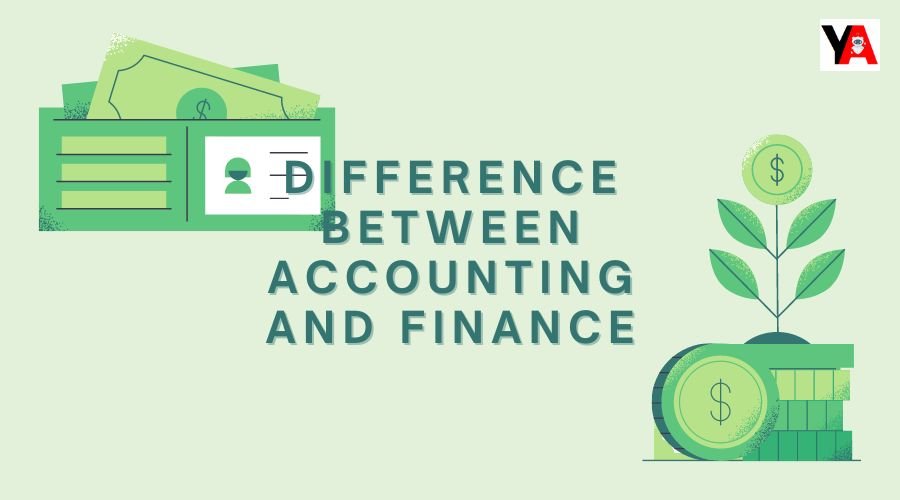The term “accounting” or “finance” frequently refers to the same thing in business and finance, causing confusion for those who are not familiar with these areas. While accounting and finance are essential components of an organization’s financial management, they involve distinct principles, practices, and focus areas. This article aims to clearly understand the real difference between accounting and finance.
Table of Contents
ToggleUnderstanding Accounting
Definition
Accounting is a process to record, classify, summarise and analyze an organization’s accounting transactions. It involves the systematic and accurate measurement of financial data to generate financial reports, statements and analyses.
Accountants are vital in providing financial information that facilitates decision-making, performance evaluation and compliance with legal and regulatory requirements.
Roles and Responsibilities of Accountants
Accounting practitioners may perform several tasks, such as maintaining books of accounts, running general ledgers, creating financial statements, analysis of financial data, conformity with tax rules and providing advice on financial matters. They use accounting principles, standards, and software to organize and present financial information clearly and meaningfully.
Financial Discovery
Definition
The term “finance” describes how an organization manages its money, investments, and financial resources. It includes budgeting for beginners, forecasting, risk assessment, financial analysis, and strategic planning.
To fulfill the organization’s financial objectives and increase shareholder value, finance professionals optimize resource allocation.
Roles and Responsibilities of Accountants
Financial professionals perform many organizational functions, such as financial analysts, money managers, and investment bankers. They assess financial risks, assess investment opportunities, develop financial strategies, analyze market trends and make recommendations for effective capital management. To make wise decisions, financial experts use statistical tools, economic data, and financial models.
The Critical Difference Between Accounting and Finance

Orientation and Goals
The primary purpose of accounting is to accurately record, classify and report financial transactions. It strives to give a thorough analysis of the workings and financial standing of an organization. Conversely, finance focuses on managing financial resources, analyzing investment opportunities, and determining how best to use money to achieve organizational goals.
Scope
Accounting is about historical financial data and transactions. It is about recording and summarizing past events. However, finance encompasses a broader scope, including financial planning, forecasting, risk management, investment analysis, and capital budgeting. This involves analyzing the current and future financial impacts of various decisions.
Skills and Knowledge
Accounting requires a firm grasp of financial accounting principles, an understanding of tax regulations, knowledge of accounting software, and attention to detail. Accountants need to possess strong analytical and problem-solving skills.
Financial professionals must be knowledgeable in financial markets, investment strategies, risk-management techniques, and interpreting financial statements. They also require strong skills in quantitative and qualitative analysis.
Career Path
Forensic accounting, management accounting, auditing, and tax accounting are just a few of the career opportunities available to accountants. While handling financial data, these experts routinely check for correctness and compliance.
Among the career opportunities in finance include financial planning, corporate finance, investment banking, risk management, and portfolio management. Financial professionals focus on strategic decision-making, investment evaluation, and financial analysis.
Tools and Techniques
Accountants use different tools and software, such as accounting software, spreadsheets, and databases, to process financial information. To maintain uniformity and comparability, they employ GAAP and IFRS. Generally Accepted Accounting Principles is what this term refers to.
Financial professionals use financial models, valuation techniques, risk assessment tools, and statistical analysis software to evaluate investment opportunities, generate financial forecasts, and analyze trends.
Similarities Between Accounting and Finance
Although accounting and finance have distinct characteristics, they are interconnected and depend on each other for effective financial management.

Both areas aim to improve the financial performance of an organization, provide decision support and ensure compliance with legal and regulatory requirements.
Financial data generated by accounting valuable input for financial analysis and strategic decision-making by financial professionals.
Additional Information
Accounting and finance are two fields that play an essential role in organizations’ financial management. Although they share some similarities and often work in tandem, they have fundamental differences in their goals, methods, and focus areas.
Objective
The primary goal of accounting is to accurately record, classify, and summarize an organization’s financial transactions. It seeks to present a transparent and complete view of the organization’s financial situation and performance.
On the other hand, finance is concerned with managing financial resources, making strategic decisions, and optimizing capital allocation to achieve the organization’s financial goals.
Methodology
Accounting follows a structured and systematic approach to recording financial transactions. It shall comply with accounting principles such as the Generally Accepted Accounting Principles GAAP or International Financial Reporting Standards IFRS to ensure consistency and comparability.
Accountants employ accounts like balance sheets, income statements, and cash flows to provide precise financial data. Finance, on the other hand, uses the techniques of financial analysis, forecasting, risk assessment, and investment assessment techniques to make informed decisions. This often involves using financial models, statistical tools, and economic indicators.
Area of Interest
Accounting mostly focuses on historical financial data. It emphasizes the importance of keeping trustworthy financial records, abiding by tax regulations, and creating financial reports for both internal and external stakeholders. Accountants play a key role in ensuring the accuracy of financial data and providing details about a company’s financial situation.
Finance, on the other hand, has a larger range of uses. It includes financial planning, budgeting, capital management, risk assessment, and investment analysis. Financial professionals assess various decisions’ current and future financial impacts and strive to maximize the organization’s value.
A detailed understanding of financial regulations, accounting techniques, and accounting principles are necessary for accounting. Strong analytical, problem-solving, and attention to detail skills are essential for accountants. They must also have good communication skills to communicate financial information effectively.
On the other side, financial professionals require a solid understanding of financial markets, investing methods, risk management techniques, and financial analysis. They rely on quantitative and qualitative analytical skills to assess investment opportunities, forecast financial trends, and make strategic decisions.
Accountants have a variety of career opportunities, including financial accounting, management accounting, auditing, tax accounting, and forensic accounting. Professionals in these roles work closely with financial data, ensuring accuracy, compliance, and financial reporting.
There are several career options in finance, including financial planning, corporate finance, investment banking, risk management, and portfolio management. Financial professionals focus on strategic decision-making, investment evaluation, financial modeling, and financial resource management. It is important to note that although accounting and finance have distinct characteristics, they are interrelated and interdependent.
Both areas contribute to the overall financial management of an organization. Financial data generated by accountants is valuable input for financial analysis and decision-making by financial professionals.
Final Words
Accounting and finance are both essential components of a company’s financial ecology, but they have different goals, roles, skill sets, and career paths. Accounting is primarily concerned with recording and reporting financial transactions, whereas finance is typically involved with managing financial resources, making strategic decisions, and assessing investment chances. It is essential to understand the fundamental differences between accounting and finance for anyone interested in a career in either of these fields or looking for financial expertise for their company.
Frequently Asked Questions
Accounting and finance are separate fields, although they are closely related. Accounting shall provide financial data and reports, which finance professionals can use for accurate decision-making and effective management of funds.
Yes, individuals can pursue a career in accounting and finance. Knowledge and skills gained in one area can complement and enhance understanding in the other, opening up opportunities in different finance roles.
Top skills for a successful accounting career include attention to detail, analytical thinking, problem-solving, knowledge of accounting principles and software, understanding tax regulations and communicating effectively.
Accounting and finance in a corporation communicate via exchanging financial data. Accounting provides accurate and timely financial data, which financial professionals analyze to make strategic decisions, assess financial risk, and plan for the future.
A few examples of accounting positions include financial accountant, management accountant, auditor, tax accountant, and forensic accountant. Among the positions offered in the field of finance are those of financial analyst, chief financial officer, investment banker, risk manager, and portfolio manager.




















